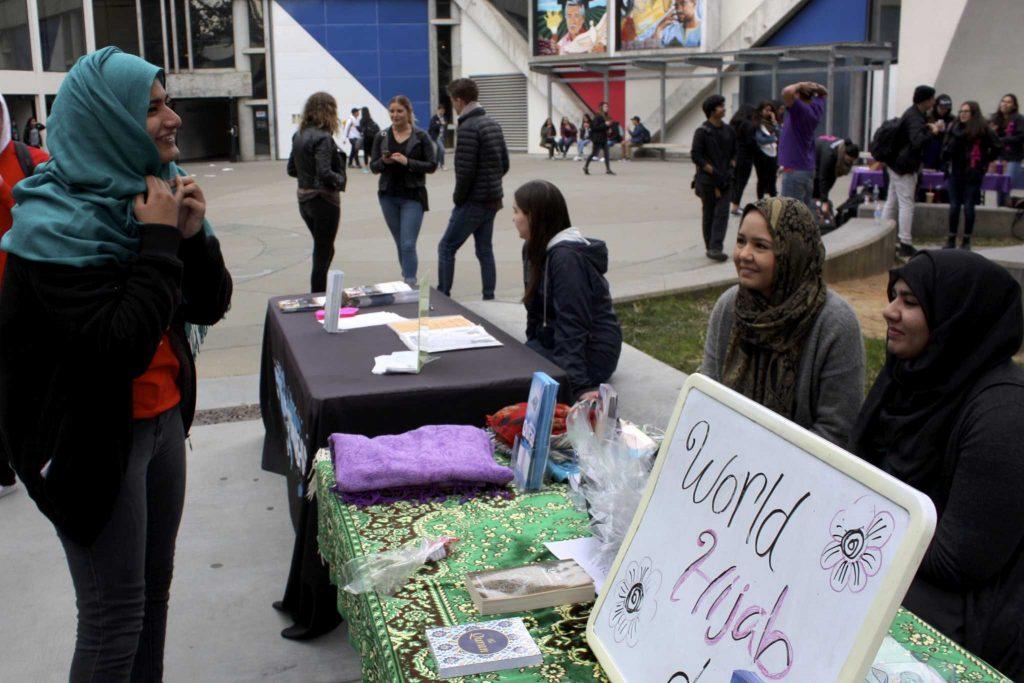After a weekend of tension following President Trump’s immigration ban, SF State students were welcomed with the opportunity to try on hijabs on World Hijab Day Jan. 30 in the quad.
Hosted by the University’s Muslim Women Student Association, the event aimed to combat misconceptions about what it means to wear a hijab.
“Many people think this is forced, or it oppresses us,” said Yasra Syed, president of the Muslim Women Student Association. “But this is actually about empowerment. Women make the choice themselves to wear the hijab.”
Syed said the association encouraged questions from students and offered to help anyone put on a hijab, regardless of differences in opinions, beliefs or values.
The hijabs provided came in an array of colors and patterns and as Syed explained, they are considered a symbol of modesty.
“During this time, it’s especially important for people to know about this,” said Syed. “I am just like you. We are all in this together.”
The association also offered pamphlets on Islam, including one flier that explained that wearing a hijab is a personal and independent decision, and that the primary motivation is a commitment to God.
“When a Muslim woman dawns the hijab, it is her speaking out to the world saying ‘I am representing my religion,’” said Maham Kahn, MWSA vice president.
“It humbles me. It gives me a sense of comfort and freedom. I can be confident in wearing it,” Kahn said. “It really has nothing to do with a man.”
A former member of the MWSA, whose sorority was also tabling in the quad, brought a hijab for some of the members of her sorority to try on.
“With what’s happening in recent events, it’s important for people to get more educated,” said civil engineering major, Mamunna Gorsi, who helped tie hijabs on her friends.
She said there needs to be a better understanding of what Muslims are about.
“This is not harmful,” Gorsi said.
Gorsi does not wear the hijab and believes every woman lives with enough freedom to make that decision for herself.
The association has hosted World Hijab Day for a long time, with the goal of representing SF State’s Muslim community, according to Kahn. The participation of several Muslim and non-Muslim students help them achieve that goal.
“It’s always a big success,” Kahn said.
But Kahn said there was a bigger audience this year.
“With what we’ve faced this year, people were a lot more accepting and willing to come out … and support Muslims, to the best of their abilities,” Kahn said. “It could just be as simple as walking by and acknowledging Hijab Day.”
With the temporary immigration ban still fresh in everyone’s mind, MWSA is going forward by continuing to work closely with other Muslim organizations and plans to hold web seminars to spread information about how to feel safe as a Muslim on campus while still representing oneself. The organization also attends protests and signs petitions with the intent to revoke what President Trump has done.
“With what’s been going on, people are more willing to hear our side of the story,” Kahn said. “I can’t say that for everyone in America, but I am so grateful to be born and raised here.”
As World Hijab Day was celebrated around the world, the MWSA hopes to hold more events like these to bridge the gap between cultures, and may hold another Hijab Day later in the semester.
“If you’re curious about Islam, or Muslim women, or why they wear the hijab, I think rather than suppressing the questions and that genuine curiosity, if one were to go out and reach out to Muslim women, I’m sure that they would be willing to answer each and every one of their questions, especially if it comes from a place of genuine curiosity and not hatred,” Khan said.
“The best way to learn is from experience.”







